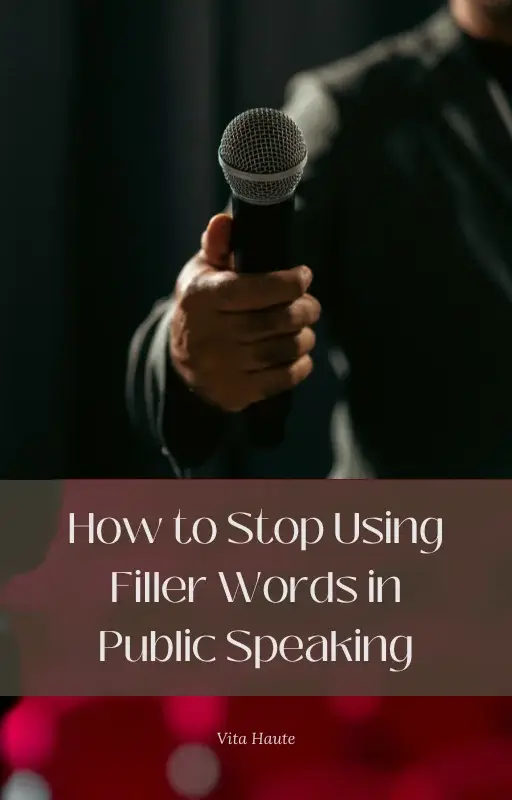Words such as “um,” “like,” and “you know” often appear in conversation to give speakers time to think. For some, this can indicate a lack of confidence in their own ideas. Others utter filler words while talking to people at cocktail parties or presentations, reflecting nervousness or limited preparation. These words influence how people respond to your speech and can distract listeners from your actual message.
If you want to sound confident and earn the attention and respect of colleagues and potential clients, reducing filler words can help significantly. In everyday conversations, occasional fillers signal authenticity, showing that a person is speaking naturally rather than rehearsing. The goal isn’t to eliminate them entirely, but to use them less often. With attention and practice, you can gradually minimize their use.

How to Remove “Um” from Daily Conversations
If someone asks you a question, take time to collect your ideas. Pause while speaking to organize your thoughts. This strategy helps you start confidently and reduces reliance on verbal crutches. You can also use this approach when transitioning between topics. Here’s a simple formula to reduce “um” in daily conversations:
- Pause While Presenting Ideas
- Collect the Thoughts or Ideas You Want to Share
- Speak Energetically According to the Plan You Designed
Along with these suggestions, the following tips can further help you reduce filler words.
Recommended Tricks to Reduce Filler Words like “Um”
People usually rely on fillers to perform more effectively in their presentations or when talking to strangers. Impromptu conversations in life are often marked by such verbal faux pas. Here are some tricks, grounded in psychology, to help you overcome them:
Recognize Situations That Trigger Filler Words
Trying to appear knowledgeable under pressure can increase filler word use. Once you’ve identified situations that trigger verbal disfluencies, you can prepare yourself to respond calmly and confidently.
Practice Speaking Alone
Talk to yourself on a general topic for about one minute. Avoid filler words during spontaneous speech. Record yourself on a phone or computer, then listen to identify disfluencies. Gradually, you can reduce these words from your everyday speech.
Ask a Friend to Count Your Filler Words
Ask a friend to track your verbal crutches during conversations. You can also ask colleagues to alert you when you use fillers. This awareness helps you minimize filler words effectively.
Speak Slowly and Deliberately
Some people get nervous when talking to strangers or trying to create an impression on others. When this happens, they may struggle to gather their thoughts and end up using filler words. Practice speaking slowly and gently. This allows you to assemble your ideas clearly and express them professionally. Over time, speaking at a measured pace will naturally reduce words like “um.” Experts say this is one of the easiest ways to avoid verbal crutches.
Use Short and Meaningful Sentences
Research shows that simplifying your speech improves fluency and confidence. Focus on using short sentences rather than compound ones. Simple sentences help you avoid filler words like “um” while speaking. Additionally, avoid starting sentences with prepositions, as this can increase confusion and lead to verbal disfluencies. Limiting your speech to short, meaningful sentences helps maintain clarity and minimizes informal crutches.
Avoid Overwhelming Eye Contact
Sometimes, intense or prolonged eye contact can make you nervous, triggering filler words like “um” or “uh.” Instead of avoiding eye contact entirely, distribute your gaze naturally across your audience. Briefly make eye contact with different people to engage them, then look away to gather your thoughts. On video calls, focus on the camera or screen to simulate eye contact while staying comfortable. This approach reduces nervousness without appearing disconnected.
Use Strategic Silence to Your Advantage
Many fear silence in conversations, leading them to use filler words to fill gaps. Strategic pauses make your speech more impactful and give you time to gather your thoughts. Instead of saying “um” or “uh,” take a brief pause to breathe and mentally organize your next sentence. This technique makes you sound more confident and keeps your audience engaged, as they naturally anticipate your next words. Practicing intentional pauses replaces filler words with meaningful moments of emphasis.
Accept Your Imperfections
Everyone has quirks, imperfections, or moments of hesitation. Recognize that it’s normal to pause or stumble occasionally while speaking. Even the most accomplished speakers sometimes use filler words like “and” or “um.” Instead of feeling overwhelmed, accept these moments as part of natural conversation and focus on gradually improving your speaking skills.
In summary, practicing these tricks with focus and willpower can help you reduce filler words by 50 percent in your conversations. Use these strategies regularly to improve clarity and confidence in your speech.
If you’re also working on organizing your thoughts more clearly, you might find our tips on how to overcome writer’s block helpful.

I’m an entrepreneur and digital marketing enthusiast who loves helping people grow—not just in affiliate marketing, but in all areas of online business. I enjoy showing others how to build a strong brand, create meaningful content, and use tools that make work easier. Over the years, I’ve learned what truly works in digital marketing, from creating websites that convert to building an engaged audience through email and social media. After more than ten years in the field, I’ve gathered plenty of lessons I enjoy sharing through my writing and talks. I use my own experiences to help others reach their goals and build something lasting. Besides running my business, I’m a fiction writer in the speculative genre, with dozens of short stories published in various magazines and anthologies. For eighteen years, I was a Top Reviewer at Zoetrope, an online venue for creatives, where I helped members strengthen their writing. When I’m not working as a writer or marketer, you’ll probably find me cooking, reading, or watching a good baseball game. I live in New York City, where I was born and raised.
